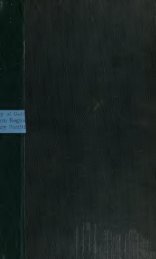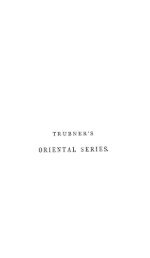Untitled
Untitled
Untitled
You also want an ePaper? Increase the reach of your titles
YUMPU automatically turns print PDFs into web optimized ePapers that Google loves.
130 / NOTES ON THE THIRD DISCOURSE<br />
Kiya Abu'l-Hasan Kushyar<br />
i<br />
ibn Labban ibn Ba-shahri<br />
flourished in the<br />
al-Jildni (of, Gilan) was' a notable astronomer y:ho<br />
latter part of the fourth century of the hijra. In his Mujmalifl-Us&Phe<br />
alludes to the year 321 of Yazdijird (A.H. 342<br />
= A. D. 953-4), and in<br />
another passage of the sarr^e work 2<br />
to A.Y. 361 (A.H. 383<br />
= A.D. 993-4),<br />
so that his active life appears to have lain between these two limits, and<br />
the date given by Hajji Khalifa (A.H. 459<br />
= A. D. 1066-7) under Zij-i-<br />
,<br />
'<br />
Kushydr is certainly too late. See also Brockelmann, i, 222-3.<br />
Abu Yiisuf Ya'qub ibn Ishaq . . al-Kindi, entitled "the<br />
Philosopher of the Arabf," traced his descent from Ma'di-Karib, tand<br />
belonged to an Arabian family equally notable for ancient and noble<br />
lineage and honourable achievements. How our author can have represented<br />
him as a Jew is incomprehensible. The story ?bout him and<br />
Abii Ma'shar, however, derives some confirmation from the Fihrist*.<br />
He composed some 270 works on Logic, Philosophy, Geometry, Arithmetic,<br />
Music, Astrology and Medicine, of which about a -score are<br />
extant in European libraries 4 . The date of his death is not known, but<br />
he flourished in thfe reigns of al-Ma'miin and al-Mutawakkil (A.H. 19?-<br />
247; A.D. 813-861). It is not clear on what authority Dr Heinrioa<br />
Suter 3<br />
gives A.H. 260 (A.D. "873-4) as the date of his death. He was<br />
noted for his parsimony, and a good many pages are devoted to him in<br />
6<br />
the "Book of Misers" (Kitdbu'l-Bukhald) of . al-Jahiz A number of his<br />
sayings in praise of this unattractive quality are quoted on p. 206 of the<br />
Persian notes from Ibn Abi Usaybi'a's "Lives of the Physicians"<br />
(vol. i, pp. 208-9).<br />
Note XXIV. Certain astrological terms.<br />
(Text, pp. 56, 59 and 62; Persian notes, pp. 206-8.)<br />
In these anecdotes about astrologers and their predictions there<br />
occur a few technical terms which can be properly understood only by<br />
trtose (few in these days) who have made Astrology the special object<br />
of their studies. Amongst such is Mr Ralph Shirley, editor of the<br />
Occult Review, who has most kindly supplied me with the valuable<br />
notes which I have placed after<br />
and Persian works.<br />
*<br />
the explanations derived from Arabic<br />
'<br />
''<br />
6 x<br />
i. Khaby and Damir (j*+~e 3 trj*-)-<br />
The explanation of these terms, which I have translated by. "divina-<br />
tion and thought-reading," is given by Abu Rayhan al-Biruni in a passage<br />
of his Tqfhim, quoted by Mirza Muhammad ip the Persian notes,<br />
(pp. 206-7), f which the translation is as follows:<br />
1 Brit. Mus. MS. Add. 7490, f. 22 b .<br />
2<br />
Ibid., f. 4*. For a description of this fine MS. see Rieu's Arabic Supplement,<br />
PP- 5'3-9'<br />
3 Ed. FlUgel, p. 277.<br />
4 See Fliigel's Al-Kindt genannt der Philosoph der Araber, in \he*AbhaitJlung f.<br />
di Kuniie des Morgenlandes, vol. i, part i (Leipzig, 1857); the long notice in<br />
?<br />
><br />
al-Qifti Tarikhifl-Hukamd, pp. 366-378; and Brockelmann, i, 209-210.<br />
8 In his Die Mathematiker und Astronomen der Araber und ihre Werke (Leipzig,<br />
1900).<br />
6 Cairo e(\.of 1323/1905-6, pp. 64-76.<br />
.<br />
i<br />
I








![La religione di Zarathustra nella storia religiosa dell' Iran [microform]..](https://img.yumpu.com/15970820/1/151x260/la-religione-di-zarathustra-nella-storia-religiosa-dell-iran-microform.jpg?quality=85)


